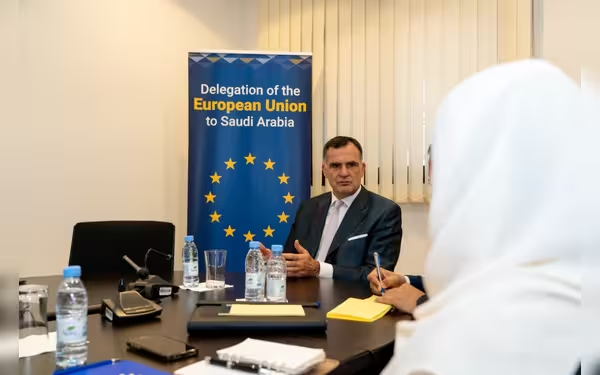Saturday, November 16, 2024 08:42 PM
GCC-EU Summit: A Call for Regional Stability and Cooperation
- GCC and EU urged to collaborate for regional stability.
- Ambassador emphasizes need for a common language.
- Summit to address Palestine, trade, and climate change.
 Image Credits: arabnewspk
Image Credits: arabnewspkGCC and EU urged to unite for regional stability at the inaugural summit addressing key crises and cooperation.
In a world where regional stability is increasingly threatened by various conflicts, the Gulf Cooperation Council (GCC) and the European Union (EU) are being urged to collaborate more closely. This call for cooperation comes from Christophe Farnaud, the EU’s ambassador to Saudi Arabia, Bahrain, and Oman, as the inaugural GCC-EU Summit approaches. Scheduled to take place in Brussels on October 16, this summit aims to address pressing issues affecting the Arab region, including the ongoing conflicts in Palestine, Lebanon, Sudan, and Yemen, as well as the Houthi attacks on shipping in the Red Sea.
During a recent roundtable discussion, Farnaud emphasized the importance of unity in addressing these crises. He stated, "We have to work together for the stability of the region … we have to work together to promote diplomacy and stability and negotiate solutions to the current crises of the region." This sentiment reflects a growing recognition that the challenges faced by the region require a collective response, rather than isolated efforts.
Farnaud pointed out that the summit will not only focus on conflict resolution but will also cover a wide range of topics, including trade, innovation, education, and people-to-people relations. These discussions are aimed at strengthening ties between the GCC and the EU, fostering a spirit of collaboration that can lead to mutual benefits. He noted, "I’m quite optimistic that there will be common talk and common language on Palestine, on Lebanon, on other topics like that, which I think is really needed at the moment."
One of the key points raised by Farnaud is the necessity of adopting a "common language" among the GCC and EU nations. He believes that if both blocs can present a united front, it will enhance their influence in negotiations and discussions surrounding regional issues. "If all the Europeans and all the GCC countries speak in one voice, it gives more weight to what we have," he explained. This approach is particularly crucial in a time when divisions can undermine efforts to convey strong messages to conflicting parties.
As the summit approaches, there is also anticipation regarding the recognition of Palestine as a sovereign state. Farnaud highlighted that while some EU member states, including Slovenia, Spain, and Ireland, have officially recognized Palestine, the timing of recognition by other countries remains uncertain. He stated, "On Palestine, the position of the EU, the core position of the EU, is more united than what people think at times." This indicates a potential shift in the EU's stance, which could have significant implications for the region.
Furthermore, the summit is expected to build upon existing economic, trade, and investment cooperation between the GCC and the EU. In 2023, trade exchanges between the two regions reached an impressive €170 billion ($186 billion). Farnaud noted that discussions will also encompass global challenges such as climate change, sustainable development, and energy transition, emphasizing the need for collaborative efforts in these areas.
In addition to economic cooperation, the ambassador mentioned the possibility of establishing a Schengen-style arrangement for visa-free travel between GCC and EU countries. He expressed hope that both regions could work towards this goal, although he acknowledged that the timeline remains uncertain. "The goal remains, at some point, but it is difficult now to say when," he remarked.
Reflecting on the historical relationship between the GCC and the EU, Farnaud pointed out that the foundations for cooperation were laid as far back as 1988. He stated, "The relations are not new. But since we have shared interests and close relations we have to go further." This upcoming summit is a significant step in that direction, following a ministerial council meeting in Muscat, Oman, last year, which was prompted by the escalation of violence in the region.
The inaugural GCC-EU Summit represents a pivotal moment for both blocs as they seek to address pressing regional issues and enhance their cooperation. By working together, the GCC and EU can not only promote stability in the Arab region but also tackle global challenges that affect us all. As the world becomes increasingly interconnected, the importance of collaboration and dialogue cannot be overstated. The outcomes of this summit could very well shape the future of relations between these two influential regions, paving the way for a more stable and prosperous future.













